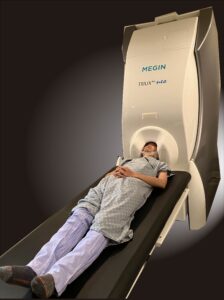
The Athinoula A. Martinos Center for Biomedical Imaging, part of Massachusetts General Hospital and Harvard Medical School, is a premier institution offering advanced imaging services, particularly for clinical patients with neurological conditions such as epilepsy.
Magnetoencephalography (MEG): MEG is a non-invasive technique that measures the brain’s magnetic fields, offering millisecond-level temporal resolution. It is particularly useful for localizing epileptic activity and mapping brain function before surgery, helping to preserve critical areas like language and motor regions. Compared to electroencephalography (EEG), MEG provides better spatial accuracy since magnetic fields are less distorted by the skull. MEG also avoids the need for ionizing radiation or contrast agents, making it a safe and precise tool for studying dynamic brain processes.
7 Tesla (7T) MRI: The 7T MRI scanner at the Martinos Center is one of the most advanced imaging tools available. Its ultra-high magnetic field strength delivers exceptionally high-resolution images, revealing fine anatomical details and subtle abnormalities. This capability is crucial for diagnosing and managing complex neurological conditions, including epilepsy, brain tumors, and other brain masses by offering detailed insights into brain structure and function.
The Martinos Center’s state-of-the-art facilities and commitment to innovation make it a premier resource for clinicians and researchers, advancing the diagnosis and treatment of epilepsy and other neurological disorders through cutting-edge imaging technologies.
Contact
Athinoula A. Martinos Center for Biomedical Imaging
149 13th St, Charlestown, MA 02129
(617)726-8517; Diana Ion dmion@mgh.harvard.edu or Nao Matsuda nsuzuki1@mgh.harvard.edu
Scan Booking
- Book your MEG scan here (currently not available)
- This booking system is not open to the general public. It is intended only for patients or their families who have been recommended by their provider or epileptologist collaborating with us. If you are a self-referred patient or have any concerns related to booking, please reach out to us.
Complete before your MEG scan
MEG information
- Link to Recent Advancement (pdf)
- Link to What is MEG (word)
- Link to MEG video demonstrating acquisition and analysis (webpage)
- Link to vendor’s homepage (MEGIN)
- Clinical Staffs
- Steven Stufflebeam, M.D. (Clinical MEG director)
- Nao Matsuda (Chief Technologist)
- Diana Ion (Technologist)
- Teppei Matsubara (Research Fellow), M.D., Ph.D.
- Naoaki Tanaka (MEG Neurophysiologist), M.D., Ph.D.
- Alexander Robertson, RT(MR), MRSO
- Lynelle Ferreira, RT(R)(MR), (MRI Technologist)
- Jacob Calkins, RT(R)(MR), MRSO (MRI Technologist)








Complete before your MRI scan
- Link to MRI screening form (pdf; send this form before your MRI appointment)
- Link to Microsoft Forms for MRI screening (Microsoft Forms; currently not available)
FAQ
<MEG>
(1) What is the purpose of MEG?
The primary purpose of MEG is to map where seizures arise in the brain by detecting interictal discharges—MEG is not intended to capture ictal events. It can also be used to identify functional areas of the brain, such as those involved in language, hearing, vision, and touch.
(2) What should I do before and during the MEG measurement?
Before entering the MEG room, an electroencephalography (EEG) cap and additional electrodes around your face will be applied, as EEG provides complementary information. You will also be asked to change into a gown. This setup typically takes about 30-45 minutes.
Once inside the magnetically shielded MEG room, you will lie on a bed with your head inside the helmet. It is important to remain still during the 50-minute measurement, preferably taking a nap to minimize movement and ensure accurate data. Listening to music or watching movies is typically not allowed during the measurement. After the MEG session, additional functional mappings will be performed.
(3) My child undergoing MEG has cognitive impairments or is too nervous. I don’t think they can stay still during the measurement. Can a family member stay with them?
If the subject is too young, has cognitive impairments, or is too nervous to stay still during the MEG measurement, a family member may be allowed to stay in the room to provide encouragement and support. For those who are nervous, we can offer intermittent breaks during the session, and it is permissible to take anti-anxiety medication prescribed by your healthcare provider before the procedure. Please note that anesthesia injections are not allowed at the Martinos Center.
To help ease concerns, we can also arrange for the subject to visit the MEG room beforehand without undergoing the scan. They may bring comfort items, like a stuffed animal, to become familiar with the room and positioning. The actual scan can be scheduled for another day if needed.
While it is important to minimize body movements, brief movements are manageable as long as the subject’s head stays inside the helmet. MEG records brain activity continuously, and we can focus on periods when the subject is still to ensure we capture usable data.
(4) I have medical devices implanted. Can I undergo MEG?
MEG is a passive machine, so there are generally no contraindications for individuals with implanted medical devices such as shunts, vagus nerve stimulators (VNS), deep brain stimulators (DBS), responsive nerve stimulators (RNS), pacemakers, or cochlear implants. However, some devices may cause noise in the MEG recordings, making the data more challenging to interpret. If possible, it’s recommended to turn off these devices beforehand to reduce interference. Please contact the MEG staff for specific guidance regarding your device.
(5) I have claustrophobia. Can I undergo MEG?
Many individuals with claustrophobia can tolerate MEG, as the helmet does not fully cover the head or the body. It is also permissible to take anti-anxiety medication before the procedure, though anesthesia injections are not allowed at the Martinos Center. Medication should be prescribed by your healthcare provider, so please consult with them before your appointment.
(6) Can I continue taking my regular medications before MEG? Is there any preparation required?
Yes, you can continue taking your regular medications, including antiseizure drugs, before MEG. There is no need to reduce or stop medications unless instructed by us.
For optimal data quality, please wash your hair the day before your appointment and avoid caffeine. Sleep deprivation is recommended to enhance spike detection. For further instructions, please refer to the link above.
<7T MRI>
(1) I have experience with regular MRI. How is it different from a 7T MRI?
At our facility, we have both FDA-cleared 7T and 3T MRI scanners. While conventional MRIs found in most hospitals are typically 3T, the 7T MRI offers higher magnetic field strength, enabling greater detail and precision in imaging.
Although the 7T MRI provides enhanced resolution, our 3T MRI is also highly effective, featuring advanced coils that improve spatial resolution. Both systems offer excellent imaging capabilities, with the 7T MRI being especially suited for more detailed or specialized scans.
(2) I have medical devices implanted and was allowed to undergo MRI previously. Can I undergo 7T MRI?
The 7T MRI is significantly more powerful than conventional MRI and requires stricter screening, as it is a relatively newer technology. It is generally unlikely that individuals with implanted medical devices such as shunts, VNS, DBS, RNS, pacemakers, or cochlear implants will be cleared for a 7T MRI.
If you have a history of surgery involving implanted metal devices (e.g., coils), you will need to provide surgical reports to confirm the product name and details of the implanted device. You must also complete the screening form before your appointment to ensure safety.
(3) I have recent tattoos. Can I undergo 7T MRI?
Tattoos less than 2 weeks old are not permitted for 7T MRI. Additionally, specific criteria apply depending on the location and type of tattoo. Please complete the screening form to determine eligibility.
<General>
(1) How do I reach the Martinos Center?
A free MGH shuttle (white bus with “Mass General Brigham” written on the sides) is available either from the MGH main campus or North Station (Green/Orange lines and Commuter Rail). Ask the driver if the shuttle goes to Building 149 on 13th Street in the Charlestown Navy Yard, which is the last stop. The shuttle map in this link is also useful for navigating to the Martinos Center in the Charlestown Navy Yard.
If you drive, parking is available in the lot next to Building 149, and we can provide parking validation.
(2) When and how will I receive the reports of the studies?
While the staff cannot provide immediate results, the reports will be electronically sent to your healthcare provider within 2-3 weeks. You will receive the results directly from your provider.
(3) Is it possible to obtain a CD copy of my MRI?
Yes, you can request a CD copy of your images using this link. This can be done either in person at the MGH Main Campus or by submitting an online order form.
Quick checklist for the provider
<MEG>
- Medical Devices: If the patient has VNS, DBS, or RNS, please turn off the devices if applicable. If the patient has a shunt with a programmable valve, please turn it off if applicable.
- Cochlear Implants: These are not acceptable for the scan unless removed, as they cause significant artifacts.
- Dental Work: Implants and braces should be removed if possible. If not, artifacts may appear, but the scan can still proceed.
- Neurosurgical History: Clarify any implanted materials such as plates, coils, or clips.
- Claustrophobia, Anxiety, Cognitive Impairment, Young Patients: Consider prescribing an oral anxiolytic if needed.
- Age Limitation: No age limitation; patients of all ages can be scanned.
- MRI Availability: MRI is necessary for MEG analysis. Preferably, recent images acquired within the past year. If not available, we recommend scanning at Martinos. The preferred sequence is dense T1/MPRAGE (1mm). Images may be shared via PowerShare or CD.
<7T MRI>
- Medical Devices: Patients with VNS, DBS, RNS, shunts, or cochlear implants are not allowed for 7T MRI. For other considerations, please contact us.
- Neurosurgical History: Similar to MEG, clarify any implanted materials such as plates, coils, or clips.
- Claustrophobia, Anxiety, Cognitive Impairment, Young Patients: These conditions may require anxiolytic medication or other accommodations, similar to MEG.
<General>
Please provide the following information at the time of request:
- Clinical notes/history of the patient’s intractable epilepsy, including LTM results and the official report of the last MRI.
- Insurance information (insurance approval is not required at the time of request).
- Contact information for the patient.
- Name, NPI, address, phone, and fax of the referring physician.


